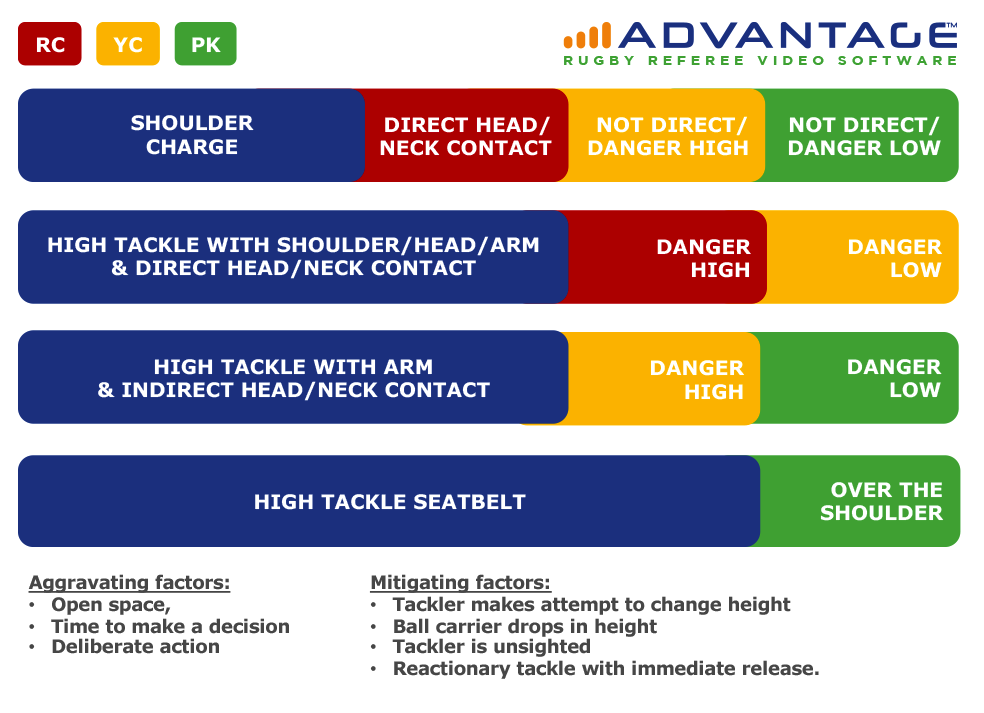|
Haylee Slaughter sends along a color-codes toolbox of phrases and non-verbal actions she put together for refs to use in communicating with players during the match.
Brian Moore wrote on a refereeing forum a few years ago about managing the scrum. He has a lot of opinions on the matter. He also knows what he's talking about. Somebody compiled the things he said into a post on RugbyRefs.com. I've reprinted the text below. Some of the information is a little dated because the laws have changed, but the principles remain the same. Managing the Scrum – Tips by Brian Moore (ex England International Rugby Hooker)Moore represented England, winning a total of 64 England caps between 1987 and 1995, making him the 13th most-capped Englishman (as of July 2007). Moore played in three Rugby World Cups including in 1991 where along with Jason Leonard and Jeff Probyn he was part of a destructive English front row as they reached the final, losing a tight match 12-6 to Australia at Twickenham. Moore was also a member of the England side which won Grand Slams in 1991, 1992 and 1995. In 1991, he was voted Rugby World Player of the Year, a decade before the sport's governing body (the IRB), began its awards programme. He went on two British and Irish Lions tours, winning five test caps. In Australia in 1989, the Lions won the series 2-1, and Moore was famously caught celebrating the morning after on Sydney Harbour Bridge, doing aeroplane impressions. Having been a vocal critic of referees for many years. Moore took the Rugby Football Union’s Entry Level Referee Award course and qualified as a referee in 2010. (http://en.wikipedia.org/wiki/Brian_Moore_(rugby_union)) The following are tips by Brian Moore in managing the scrum, these tips were extracted from a rugby refereeing forum and was submitted by Brian under the alias/user BCM666. In this forum BCM666 (Brian) says “anything I post can be disseminated to anyone; including Paddy O'Brien!” so it is with this general exclaimer that the following document is produced.Pre-game brief about scrum
This is another intro thing. Rugby Refereeing in Practice is a pamphlet the IRB (World Rugby before they changed their name and got a Marvel character logo) got from Australia and distributed for a bit as part of the Level 1 (which became Level 200 because of inflation) referee course. It's one of the things I still send out before courses, but it's not part of the official USAR package.
Turns out there are a lot more videos on the TRRA Youtube channel. Some training videos on particular topics, some short clips of one call, and some match videos with Texas refs. Check it out.
The TRRA does good webinars pretty frequently and posts them on their site. A couple of them are unavailable when I click on them for some reason, but the content is available for most of them.
Topics include:
England rugby has a referee resources page with some online courses about the scrum and the tackle and about preparing for whatever their first referee course is.
The Bay of Plenty referee society has a page with an online course on introduction to refereeing rugby. There is a downloadable workbook and a series of videos. The modules are:
Contents: Introduction and Welcome Module 1: The Role of the Referee Module 2: Fixture Organisation Module 3: Whistle! Signals! Verbals! Module 4: Where do I stand? Module 5: The Kicks of Rugby Module 6: Tackle Ball carrier brought to ground Module 7: Ruck and Maul Module 8: Scrum Module 9: Lineout Module 10: Offside and onside in general play Module 11: Foul Play Module 12: Advantage, free kicks and penalty kicks Module 13: Assistant Referee/Touch Judging Module 14: Method of scoring – ingot I don't love their list of reasons for becoming a referee, listed below. I'm pretty sure it's not a comprehensive list. But the course looks pretty good for a beginning ref.
The USAR referees resources page also has a bunch of training videos like the one I posted yesterday on various topics. At least some of them seem to also be available on Vimeo. Let's see how many of them I can put on this post before Weebly complains.
Player angles and how they affect scrums from Mike Cobb USA Rugby Referees on Vimeo. USA Rugby Advantage Training Video 7-12-12 from Mike Cobb USA Rugby Referees on Vimeo. final complete tackle training video from Mike Cobb USA Rugby Referees on Vimeo. Fall 2014 scrum training video from Mike Cobb USA Rugby Referees on Vimeo. Reading the tackle by don Morrison 2/25/12 from Mike Cobb USA Rugby Referees on Vimeo. Zone Entry (Not through the gate) referee training video. from Mike Cobb USA Rugby Referees on Vimeo. Material or not video complete video from Mike Cobb USA Rugby Referees on Vimeo. Rugby Referee Goal Setting and Action Planning. from Mike Cobb USA Rugby Referees on Vimeo. Part 2 of Pre-Tackle Awareness Recognition & Anticipation from Mike Cobb USA Rugby Referees on Vimeo. The tackle assist player from Mike Cobb USA Rugby Referees on Vimeo. How to video a referee 1-25-13 from Mike Cobb USA Rugby Referees on Vimeo. The Tackle Contest Zone Training Video from Mike Cobb USA Rugby Referees on Vimeo. |
AuthorBridget has been refereeing rugby in the US since 1998. ArchivesCategories
All
Hey, here are the laws.
|
||||||||||||


 RSS Feed
RSS Feed

